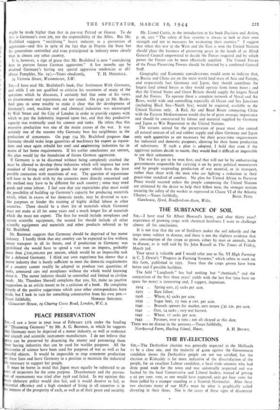Snt,—I have read Mr. Brailsford's book, Our Settlement With Germany,
and while I am not qualified to criticise his treatment of many of the questions which he discusses, I certainly feel that some of his views on disarmament and reparations are not sound. On page 22 Mr. Brads- ford goes to some trouble to make it clear that the development of Germany's steel, machine tool and chemical industries was encouraged by Wall Street and the City of London in order to provide exports with which to pay the indemnity imposed upon her, and that this productive capacity Was eventually used for cannon and tanks. He infers that this excessive production was one of the major causes of the war. It was certainly one of the reasons why Germany beat her neighbours in the production of armaments. On page 154 Mr. Brailsford proposes that Germany should make large quantities of machinery for export as repara- tions and once again rebuild her steel and engineering industries far in excess of her home requirements. If his earlier conclusions are correct, this plan would lay the foundation of future German aggression.
If Germany is to be disarmed without being completely crushed she must be allowed to develop those industries which will improve her own standard of living and provide goods for export which have the least possible connexion with munitions of war. The question of reparations will have to be dealt with by the countries most directly concerned and the method may have to be different for each country ; some may need goods and some labour. I feel sure that any reparations plan must avoid the possibility of building up Germany's capacity for producing materials which, when in excess of her domestic needs, may be diverted to war- like purposes or hinder the training of highly skilled labour in other countries. 'There should be a short list of materials which Germany must not make at all for some years and a much longer list of materials which she must not export. The first list would include aeroplanes and certain scientific equipment, the second list should include all other scientific equipment and materials and other products referred to by Mr. Brailsford.
Mr. Bateman suggests that Germany should be deprived of her motor industry. I hardly think that any country can be expected to live without motor transport in all its forms, and if production in Germany was prohibited she would have to spend a vast sum on imports, probably more than £100,000,000 per annum, which would be an impossible task for a defeated Germany. I think our own experience has showr that a motor industry that is barely sufficient to meet the domestic requirements of a country cannot readily be adapted to produce vast quantities of tanks, armoured cars and aeroplanes without the whole world knowing about it. The motor industry should be controlled and limited to civilian needs. .Mr. Theodore Shewell complains that you, Sir, make no positive suggestions in an article meant to be a criticism of a book. He complains bitterly of the positive suggestions which your other correspondents have made, but I look in vain for something constructive from his own pen.—


























 Previous page
Previous page